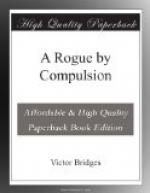Then he turned to Latimer. “I think it would be as well if I explained the position before Casement and Frinton arrive.”
Latimer expressed his agreement, and motioning me to a chair, Lord Lammersfield again seated himself at the table. His manner, though still quite friendly and unstilted, had suddenly become serious.
“For the moment, Mr. Lyndon,” he said, “the Prime Minister is out of London. We have communicated with him, and we expect him back tonight. In his absence it falls to me to thank you most unreservedly both on behalf of the Government and the nation for what you have done. It would be difficult to overrate its importance.”
I began to feel a trifle embarrassed.
“I really don’t want any thanks,” I said. “I just drifted into it; and anyway one doesn’t sell one’s country, even if one is an escaped convict.”
Lord Lammersfield laughed drily. “There are many men,” he said, “in your position who would have found it an extraordinarily attractive prospect. I am not at all sure I shouldn’t have myself.” He paused. “We can’t give you those three years of your life back,” he went on, “but fortunately we can make some sort of amends in other ways. I have no doubt that the moment the Prime Minister is fully acquainted with the circumstances he will arrange for what we humorously call a ’free pardon’; that is to say, the Law will very graciously forgive you for having been unjustly sent to prison. As for the rest—” he shrugged his shoulders—“well, I don’t imagine you will be precisely the loser for not having sold your secret to the Wilhelmstrasse. Our own War Office are quite prepared to deal in any original methods of scattering death that happen to be on the market just at present.”
There was a brief pause.
“And are we free now?” inquired Tommy, with a rather pathetic glance at the clock.
“You should be very shortly,” returned Lammersfield. “Mr. Casement has gone across to the Home Office to explain the latest developments to Sir George Frinton. We are expecting them both here at any moment.”
“Sir George Frinton?” I echoed. “Why, I thought Mr. McCurdy was at the Home Office.”
Lammersfield smiled tolerantly: “You have been busy, Mr. Lyndon, and some of the more important facts of modern history have possibly escaped you. McCurdy resigned from the Government nearly three months ago.”
“But Sir George Frinton!” I exclaimed. “Why, I know the old boy; I have a standing invitation to go and look him up.” And then, without waiting for any questions, I described to them in a few words how the Home Secretary and I had travelled together from Exeter to London, and the favourable impression I had apparently made.
Both Lammersfield and Latimer were vastly amused—the former lying back in his chair and laughing softly to himself in undisguised merriment.
“How perfectly delightful!” he observed. “Poor old Frinton has his merits, but—”




